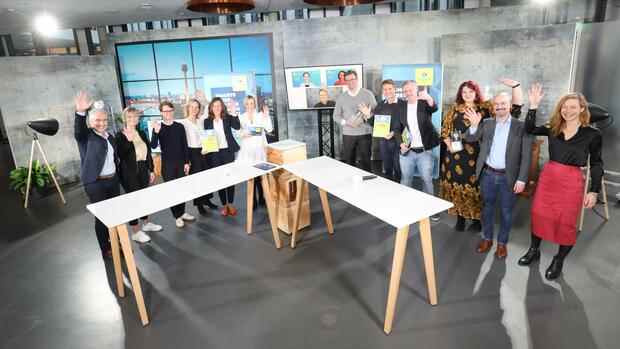For the hybrid award ceremony of the Health-i-Awards, some winners and finalists came to Düsseldorf in person, including the teams from the diagnostics company Centogene and the start-ups Mentalis and Pink.
Dusseldorf When patients with depression come home after hospital treatment, they are at risk of falling into a hole. The psychologist Christian Lukas knows this only too well. Because follow-up treatment is often not guaranteed – also because there is a lack of therapy places. That is why Lukas founded the start-up Mentalis, which aims to ensure digital aftercare for patients with depression and anxiety disorders.
Stein is Managing Director of the start-up Mentalis, which aims to ensure digital aftercare for patients with depression and anxiety disorders.
(Photo: Uta Wagner for Handelsblatt)
An idea that won over the jury at this year’s Health-i-Award: Mentalis was chosen as the winner in the start-ups category. “A transition from the inpatient to the outpatient area is always a great challenge. Mentalis offers a ready-made digital supply product with which a supply gap can be avoided,” says Jens Baas, Chairman of the Board of Directors of Techniker Krankenkasse, explaining the choice as a member of the jury.
The Mentalis app offers patients algorithm-based training and personal telecoaching with certified therapists in the transition period to outpatient treatment. Specifically, the Mentalis team wants to contribute to the fact that fewer people with depression and anxiety disorders have to be treated again in hospital because they do not have any follow-up treatment: this is currently around 30 percent.
The finalists of the award
There is no shortage of ideas in Germany on how to improve healthcare through digital innovations. This was shown by the presentations of the finalists at this year’s Health-i-Award, which took place as a hybrid event as part of the Handelsblatt Health Conference in Düsseldorf. Techniker Krankenkasse and Handelsblatt awarded the prize for the sixth time on Wednesday.
Top jobs of the day
Find the best jobs now and
be notified by email.
The makers of MyaLink also want to close a supply gap: The platform wants to connect people with a rare disease with specialist doctors. MyaLink is backed by two PhD neurologists, Sophie Lehnerer and Maike Krause, who both work at the Charité in Berlin. The two doctors won the young talent category.
The two PhD neurologists work at the Charité in Berlin. Source: Myalink.
Around four million people in Germany suffer from a rare disease. They all rely on the treatment of specialists, and these are often far removed. With MyaLink, patients can record disease-specific symptoms via an app, share the progress with their treating specialist and contact them via a message module. Doctors should be able to monitor the patient over a longer period of time and adjust the therapy remotely if necessary.
The jury of the Health-i-Awards, a panel of industry experts, was convinced of the overall concept of the project and praised the possibilities for improving patient safety and treatment. MyaLink is currently focusing on the autoimmune disease myasthenia gravis, in which communication between nerves and muscles is blocked, so that muscle weakness occurs in phases. This can lead to a strong need for help and conditions of life-threatening shortness of breath. If used successfully, MyaLink will also be extended to other indications in the field of rare diseases. The spin-off of MyaLink is planned for the coming year.
The company Centogene from Rostock, which took first place in the company category, also deals with rare diseases. During the corona pandemic, the company gained notoriety with various PCR test stations at airports and in cities. But as a diagnostics company, Centogene is primarily concerned with discovering biomarkers in the blood in order to be able to better diagnose and treat rare diseases.
Jury member Stephanie Kaiser from Heartbeat Labs presents the award to the Centogene team.
(Photo: Uta Wagner for Handelsblatt)
Centogene has developed a biomarker platform for this purpose, which uses artificial intelligence (AI) methods to substantially simplify and accelerate the discovery of biomarkers. This enables a much cheaper and faster diagnosis: According to the company, the time and material costs for biomarker searches and diagnosis are reduced by around 90 percent. To date, Centogene has discovered 14 such biomarkers.
The company also contributes to the development of suitable drugs. Jury member Stephanie Kaiser, founder of the digital health platform Heartbeat Labs, paid tribute to the pioneering role of Centogene, which with its work gives the around four million people with rare diseases in Germany new hope.
More than 200 applications were submitted for the Health-i-Award this year. The level of the submissions was rated as very high by the jury and its scientific partner, Prof. Jochen A. Werner from the Essen University Medical Center.
“The Health-i is also always a measure of innovative strength in the healthcare sector,” said Techniker-Boss Baas. The large number of high-quality projects that have applied shows that there is more and more movement in the development of digital health innovations in Germany.
More: Burda sells Jameda to the Polish health platform Docplanner
